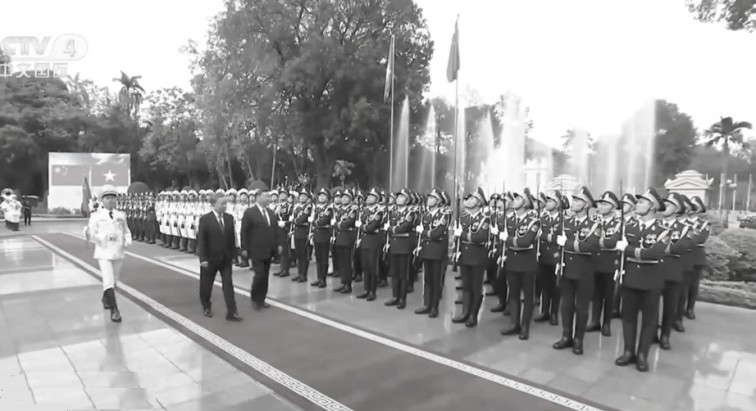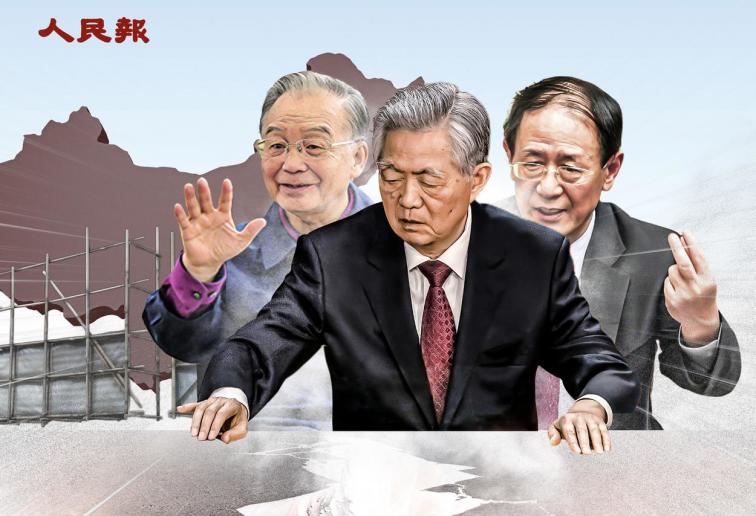March 10, 2025, Beijing Great Hall of the People—A security guard stands at the entrance before the closing ceremony of the Chinese People&9;s Political Consultative Conference. (WANG ZHAO/AFP via Getty Images)
[People News] On July 30, the Chinese Communist Party (CCP) convened a meeting of the Central Political Bureau and decided that the 20th Central Committee’s Fourth Plenary Session (Fourth Plenum) would be held in Beijing this October, also finalising the meeting’s agenda.
According to the official Xinhua News Agency report on July 30, the Fourth Plenum will mainly include the Political Bureau reporting its work to the Central Committee and discussions on drafting proposals for the 15th Five-Year Plan for National Economic and Social Development.
The July 30 Politburo meeting also analysed and studied the current economic situation and laid out plans for economic work for the second half of the year.
In the Xinhua announcement, Beijing authorities admitted that they were “facing profound and complex changes,” with “risks and challenges coexisting and unpredictable factors increasing.”
Notably, the meeting emphasised that during the upcoming “15th Five-Year Plan” period, economic and social development must adhere to Marxism-Leninism, Mao Zedong Thought, Deng Xiaoping Theory, Jiang Zemin’s “Three Represents,” Hu Jintao’s Scientific Outlook on Development, and Xi Jinping Thought on Socialism with Chinese Characteristics for a New Era. However, Xi Jinping’s signature “Four Comprehensives and Two Establishes, Two Safeguards” (4224) was conspicuously absent.
Outside observers noted that listing Marx, Mao, Deng, Jiang, and Hu’s theories before Xi Jinping Thought—and placing Xi’s ideology at the very end without giving it special prominence—could suggest a return to collective leadership decision-making, implying that Xi’s power may have been weakened. Although the statement concluded by mentioning “Xi as the core,” this appeared to be an effort to project unity and harmony within the Party.
It is widely known that the CCP often uses major public meetings for show and smaller, closed-door meetings to decide critical issues. Now that the Fourth Plenum date has finally been set, analysts believe the Party’s top leadership and retired elders—discontent with Xi Jinping’s policy missteps amid mounting domestic and international crises—have been locked in fierce internal struggles. Reports suggest these Party heavyweights have been holding private meetings, and after rounds of bargaining and compromise, they finally reached an agreement. To preserve stability in the Party’s power structure, a tentative balance has been struck, allowing the long-delayed Fourth Plenum—postponed for nearly a year—to be scheduled.
Since last year’s Third Plenum, Xi Jinping has faced rumours about health crises, and the CCP’s political scene has become unusually turbulent. Speculation about Xi losing his grip on power has spread not only among the public but also in mainstream international media.
Observers have also noted that in recent years, Xi has reduced his foreign trips and skipped major international summits, sending deputies such as Premier Li Qiang, He Lifeng, and Cai Qi in his place. This has fueled further speculation: Is Xi in declining health, or is there another undisclosed reason?
Analysts believe that, regardless of whether these rumours are true, they reflect that Xi Jinping’s authority is being seriously challenged. Most importantly, the speculation highlights a growing public sentiment that leadership change—and ultimately discarding the CCP—could bring a turning point for China.
(First published by People News)










News magazine bootstrap themes!
I like this themes, fast loading and look profesional
Thank you Carlos!
You're welcome!
Please support me with give positive rating!
Yes Sure!